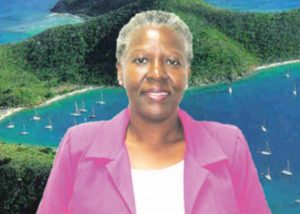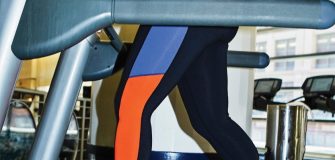Share
CHIP, the ‘Complete Health Improvement Programme’, is a lifestyle intervention education programme. It’s a 10 to 12 week course using a holistic health approach, offered in a community setting and led by CHIP certified facilitators.
 CHIP is known to prevent, control and reverse chronic, non-communicable diseases and their risk factors. It equips and empowers participants to boost their health and lead a healthier lifestyle. CHIP was officially launched in the Virgin Islands on June 15 2020.
CHIP is known to prevent, control and reverse chronic, non-communicable diseases and their risk factors. It equips and empowers participants to boost their health and lead a healthier lifestyle. CHIP was officially launched in the Virgin Islands on June 15 2020.
Ivy George, point person for CHIP in the Ministry of Health, says she recommends CHIP to mitigate against chronic diseases like diabetes and hypertension, and also as a way to boost participants’ overall health.
Ms. George sat down for an interview about the fundamentals of CHIP, like its classes, facilitators and course materials; as well as to explain the reasons why CHIP can work for the BVI community.
Q: In short, what’s CHIP?
A: CHIP is an evidence-based, scientifically proven programme that provides a roadmap for a positive journey to a lifestyle change.
Q: What are the classes like? What should participants expect?
A: Each session will run for approximately two hours. Participants of the programme will go through ten weeks of interactive learning that covers topics like weight management, relaxation, nutrition and chronic diseases, to name a few. On completion of the course, the participant will join the CHIP Club, which is a local support group to help individuals maintain their healthy lifestyle. CHIP Club will meet once a month for 12 months.
Q: What is it about the health status of the Territory that makes CHIP necessary for us? Should we be concerned?
A: Yes, we should be very concerned. We are seeing a higher incidence of persons diagnosed with diabetes, heart disease and hypertension. Besides, the rates of cancer and obesity have also increased. Also going back to 2009, a World Health Organisation surveillance programme (WHO STEP Survey) showed that 45-percent of males and 46-percent of females ages 25 to 64, had three or more risk factors for chronic diseases. The risks identified were tobacco use, harmful use of alcohol, unhealthy diet and physical inactivity.
Q: Is CHIP a government programme?
A: The BVI Government has played a leading role in establishing the programme, (but) the CHIP programme is being managed by a multi-sectoral committee made of individuals representing Non-Profit Organisations, Service Clubs, Community Health Advocates, businesses and ex officio members of the Ministry of Health Ministry. The Ministry of Health is the holder of the license to operate CHIP in the Virgin Islands. The programme targets individuals who are ready to take control of their health and need a proven roadmap to follow. CHIP is owned by the Institute of Lifestyle Medicine. In 2016, after hearing about the positive impact of CHIP, the Ministry of Health and Social Development contacted the Institute to introduce it to the BVI community. The Ministry wanted to implement a community intervention programme for reducing and preventing non-communicable diseases (NCDs) and their associated risk factors. The process was interrupted in 2017 by Hurricanes Irma and Maria, and resumed in 2018. In 2019, the Ministry of Health trained 23 facilitators, and now, we have already launched the classes.
Q: What made CHIP stand out from other programmes?
A: CHIP is scientifically-based with proven results in preventing and reversing NCDs. It is cost-effective and can be successfully run by laypersons at the community level. It provides capacity for biometric and blood screening of participants, hence the collection of data to contribute to trends in the population. And the course material is current and presented by highly trained health experts in lifestyle medicine.
Q: What’s the registration process for CHIP?
A: Persons can register by email or by telephone. Email chipvirginislands@gmail.com or call 1 (284) 468-4936. The cost of the course is $200, which covers classes and resource materials. Grants are available for persons who need financial assistance.



